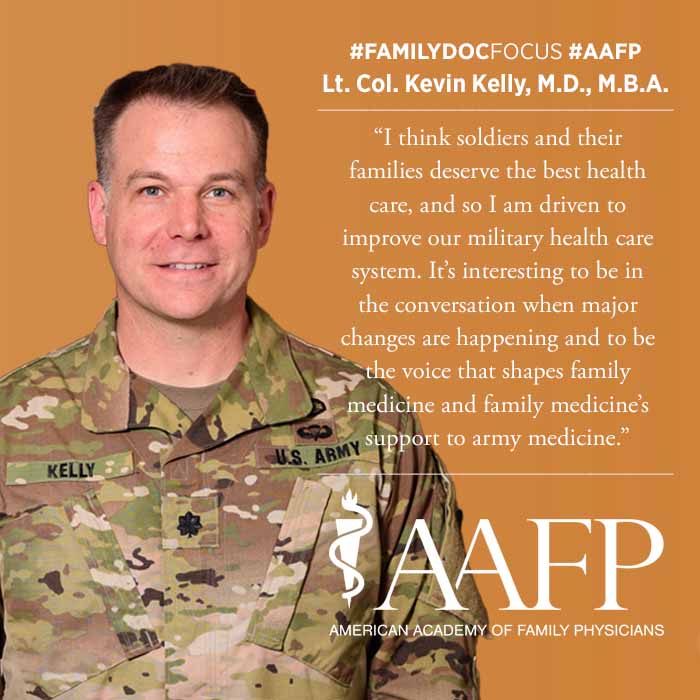Command Performance: Caring for Families in the Line of Duty
June 17, 2019 08:45 am Jill Sederstrom – Lt. Col. Kevin Kelly, M.D., M.B.A., wants his patients to have access to the medical care they need -- even if they're in the middle of a war zone or providing relief in a community recently ravaged by a hurricane.
The dedicated family physician understands that a soldier's fundamental health care needs -- whether in the realm of primary care, optometry or psychology -- don't end just because that soldier steps into danger or renders aid in an emergency.
That's why Kelly, who serves as battalion commander of the 261st Multifunctional Medical Battalion at Fort Bragg, N.C., works tirelessly in his current position with the U.S. Army to ensure that wherever a soldier is called to duty, that soldier has access to high-quality primary care and other medical services.
"I think soldiers and their families deserve the best health care, and so I am driven to improve our military health care system," Kelly explained.
Kelly oversees a deployable medical battalion of more than 500 soldiers that includes companies and units dedicated to providing urgent and primary care services, medical equipment maintenance, preventive services, optometry, dental care and other medical care services to soldiers wherever they deploy.
"Over 90 percent of the issues that the medical team deals with when we are deployed is what we call disease nonbattle injury -- so, illness or noncombat injuries," he said. "It's definitely an important part of keeping the force healthy over there so that we have as many soldiers available as possible."
Kelly's day-to-day role is to make sure the battalion is fully trained and has the proper equipment to be able to mobilize at a moment's notice.
"We have about 32 medical professionals assigned into the unit between physicians, physician assistants, dentists and psychologists that go with us, and we're responsible for getting them ready, as well," he said.
Kelly also serves as a consultant to the current Army surgeon general, Lt. Gen. Nadja West, M.D., advising on issues clinically or technically related to family medicine to ensure that those in the military and their families are able to get the best care possible during their years of service.
"It's interesting to be in the conversation when major changes are happening and to be the voice that shapes family medicine and family medicine's support to army medicine," he said.
Kelly, who received a bachelor's degree from the United States Military Academy at West Point, N.Y., before earning his medical degree at The Ohio State University College of Medicine in Columbus, has served in various positions during his military career -- from brigade surgeon to residency program director to division command surgeon -- before landing his current role as battalion commander.
Kelly and his wife, fellow family physician Christina Kelly, M.D., have had more than their share of moves across the country to accommodate his military career, and in each post, he has been able to bring the same level of passion and commitment to family medicine and the patients he serves.
Although everybody wears the same uniform, military family medicine specialists serve a diverse population of patients who come from different backgrounds and bring with them varying life experiences.
Whereas some may be leaving home for the first time, others may be struggling with being geographically separated from their loved ones, creating an interesting dynamic for the family physician.
"There's definitely an added stress on the family, and so I think family medicine brings an important perspective to that in understanding how to work within a community," Kelly said.
The views presented are solely those of Dr. Kelly and do not necessarily represent the views of the U.S. Department of Defense or the U.S. Army.
